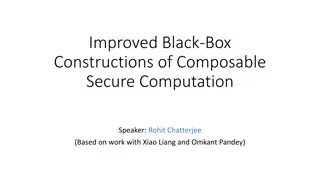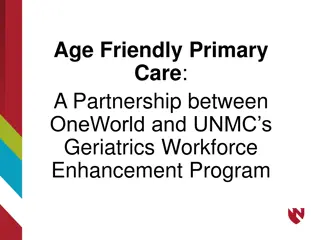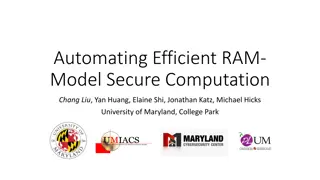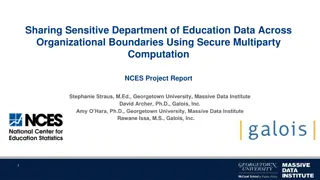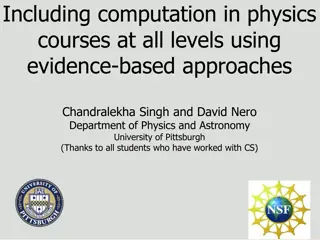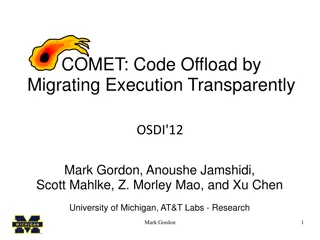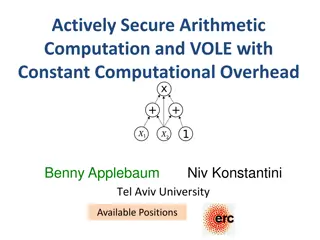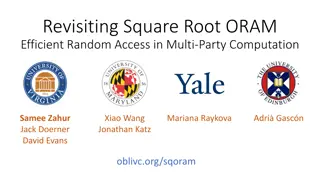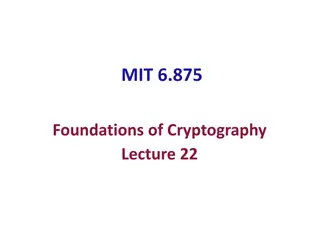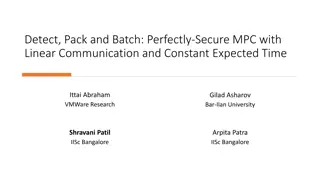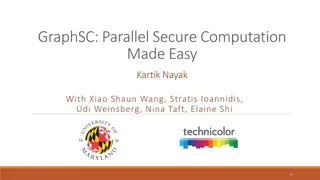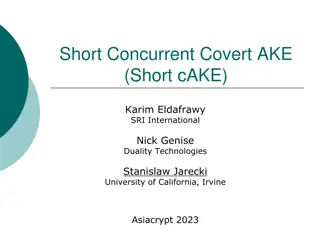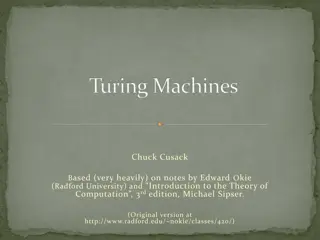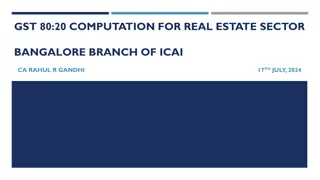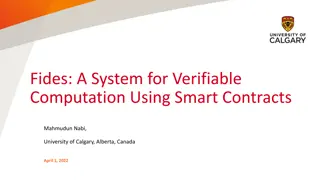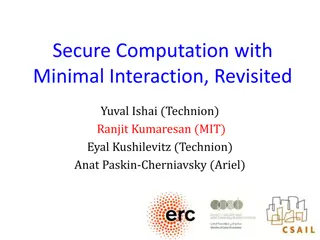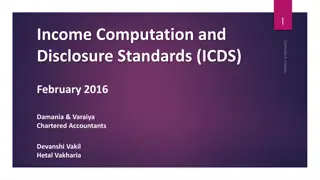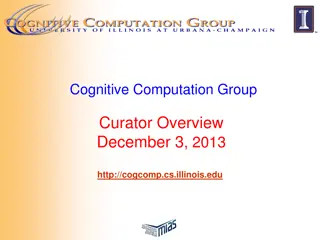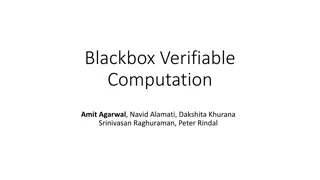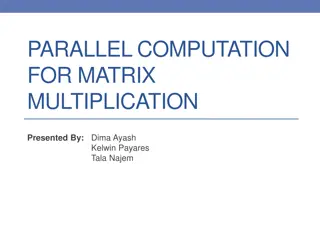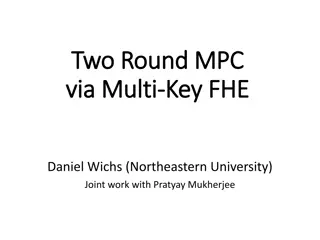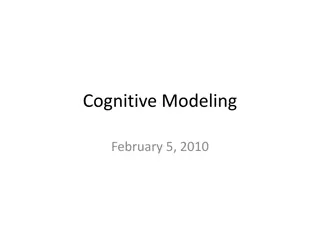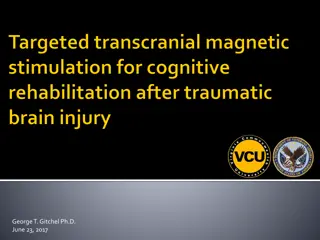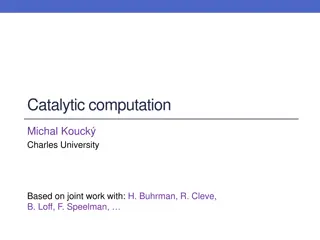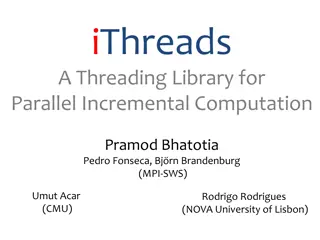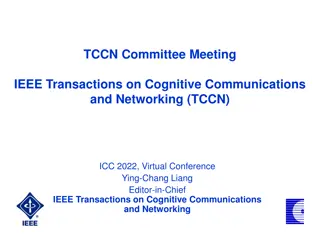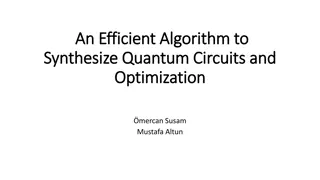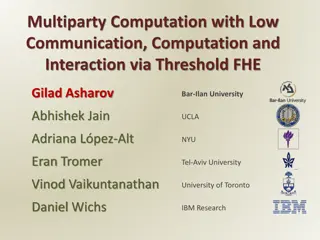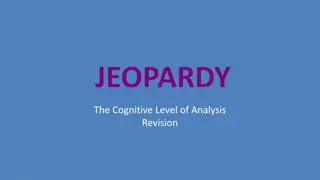Brain Mineral Deposition and Cognitive Decline Study
Investigating the progression pattern of brain mineral deposition as a differential indicator of cognitive decline in individuals with varying cognitive statuses from normal to Alzheimer's disease. The study aims to develop improved imaging techniques and specific cognitive-relevant atlases to under
5 views • 24 slides
Enhanced Security in Multiparty Computation
Explore the improved black-box constructions of composable secure computation, focusing on definitions, objectives, and the formalization basics of multiparty computation (MPC). Learn about the motivating security aspects in MPC and the real/ideal paradigm. Discover how MPC security involves compari
1 views • 68 slides
Cognitive Testing in Aging: A Vital Assessment Tool
Cognitive testing plays a crucial role in assessing cognitive abilities and distinguishing normal aging from disease states in older adults. This program, a partnership between OneWorld and UNMC's Geriatrics Workforce Enhancement Program, highlights the importance of cognitive testing, its objective
1 views • 17 slides
Secure Computation Techniques in RAM Models with Efficient Automation
Explore the automation of efficient RAM-model secure computation techniques, including examples such as secure binary search. Discover how traditional solutions using circuit abstractions can be improved for sub-linear time computation through methods like Oblivious RAM. Learn about techniques such
0 views • 37 slides
Secure Multiparty Computation for Department of Education Data Sharing
This report discusses the use of Secure Multiparty Computation (SMC) to enable sharing of sensitive Department of Education data across organizational boundaries. The application of SMC allows for joint computation while keeping individual data encrypted, ensuring privacy and security within the Nat
0 views • 15 slides
Advancements in Active Secure Multiparty Computation (MPC)
Delve into the realm of secure multiparty computation under 1-bit leakage, exploring the intersection of DP algorithms, MPC, and the utilization of leakage for enhanced performance. Discover the overhead implications of achieving active security, as well as the evolution of secure computation protoc
1 views • 43 slides
Cognitive Stimulation Therapy in Post-Acute Care: A Pilot Study
Cognitive Stimulation Therapy (CST) is an evidence-based group intervention designed for individuals with mild to moderate cognitive impairment. It aims to enhance cognitive functioning through various activities such as executive functioning tasks, multi-sensory stimulation, and reminiscence work.
0 views • 9 slides
Enhancing Computation in Physics Education Using Cognitive Approaches
Utilizing evidence-based methods, this study explores incorporating computation in physics courses, focusing on instructional design, student knowledge states, and preparation for future learning. It discusses common conceptual difficulties in quantum mechanics and proposes cognitive theory-based st
0 views • 24 slides
Early Childhood Language Learning and Bilingualism
Early childhood is a critical period for language acquisition and the development of bilingualism. Exposure to multiple languages from a young age has significant cognitive benefits. Bilingualism is a common phenomenon worldwide, with many individuals speaking more than one language. The cognitive i
0 views • 109 slides
COMET: Code Offload by Migrating Execution - OSDI'12 Summary
The research paper discusses COMET, a system for transparently offloading computation from mobile devices to network resources to improve performance. It outlines the goals of COMET, its design, and evaluation, focusing on distributed shared memory and bridging computation disparity through offloadi
0 views • 31 slides
Actively Secure Arithmetic Computation and VOLE Study
Exploring actively secure arithmetic computation and VOLE with constant computational overhead at Tel Aviv University. Understanding how functions are represented in secure computation using arithmetic circuits over boolean circuits. Efficiently evaluating arithmetic circuits over large finite field
0 views • 36 slides
Enhancing Multi-Party Computation Efficiency Through ORAM Techniques
Explore the realm of efficient random access in multi-party computation through the reevaluation of classic schemes and the introduction of new approaches. Discover the potential of ORAM in improving performance and reducing costs in various computational tasks, such as secure multi-party computatio
0 views • 22 slides
Addressing Cognitive Dysfunction in Patients with Cancer: Causes, Impact, and Treatment
Understanding cognitive dysfunction in cancer patients is crucial for improving quality of life and medical outcomes. This article explores the background, causes, screening, diagnosis, and treatment options for cancer-related cognitive impairment, emphasizing the historical perspective, prevalence,
0 views • 60 slides
Secure Two-Party Computation and Basic Secret-Sharing Concepts
In today's lecture of "Foundations of Cryptography," the focus is on secure two-party and multi-party computation, emphasizing semi-honest security where Alice and Bob must compute without revealing more than necessary. Concepts such as real-world vs. ideal-world scenarios, the existence of PPT simu
0 views • 27 slides
Linear Communication in Secure Multiparty Computation for Efficient and Fast Processing
The research focuses on achieving perfectly secure multiparty computation (MPC) with linear communication and constant expected time. It explores efficient approaches using a broadcast-hybrid model and P2P communication, aiming to balance speed and efficiency in MPC. The study highlights the importa
1 views • 23 slides
Enhancing Cognitive Flexibility for Employability
Cognitive flexibility is a crucial skill for adapting to new situations and problem-solving in today's competitive job market. This module focuses on identifying, assessing, and enhancing cognitive flexibility to nurture competitiveness and employability. Learn how to recognize the importance of cog
2 views • 24 slides
Secure Computation Challenges and Solutions in Data Mining
Exploring the intersection of secure computation and data mining, this content uncovers key challenges such as improving algorithms, converting programs for secure computation, and addressing parallelizability issues. It highlights the importance of cryptography in ensuring data privacy and presents
0 views • 30 slides
Covert Computation: Ensuring Undetectable Engagement
Covert computation aims to conceal the fact that computation is occurring and hide engagement in certain tasks like secure computation, authenticated key exchange, and more. By making messages indistinguishable and utilizing steganographic channels, it becomes possible to keep the activities covert
1 views • 16 slides
Overview of Turing Machines: Introduction, Tape, and Computation
Turing Machines are fundamental in the theory of computation, capable of recognizing all computable languages. They consist of a Finite State Machine combined with an infinite tape. The tape is initialized with input on the left end, and a TM's computation can either halt by entering special accept
2 views • 29 slides
Computation for Real Estate Sector in Bangalore Branch of ICAI
Practical overview of GST computation for real estate transactions in Bangalore, with details on old rates with ITC and new rate regime effective from April 1, 2019. The content discusses different transactions, conditions for new rates without ITC, and provides insights on the 80:20 computation met
1 views • 39 slides
Fides: A System for Verifiable Computation Using Smart Contracts
Fides presents a system for verifiable computation using smart contracts, focusing on blockchain basics, Ethereum, smart contracts, and outsourcing computation. It explores key components of blockchain, Ethereum's decentralized computing platform, properties of smart contracts, and the concept of ve
2 views • 25 slides
Impact of Yoga on Cognitive Functioning in Aging Adults
Aging is often accompanied by a decline in cognitive functions, affecting areas such as memory, attention, and reasoning. This article explores the relationship between aging and cognitive impairment, along with various treatment options including drug therapy, dietary interventions, and cognitive e
0 views • 42 slides
Insights into Secure Computation with Minimal Interaction
This paper revisits the concept of secure computation with minimal interaction, focusing on the challenges and possibilities of achieving secure multiparty computation in 2 rounds. Specifically exploring scenarios with 3 and 4 parties, the study delves into the reasons for choosing n=3, n=4, and t=1
0 views • 23 slides
Evolution of Cognitive Counseling and Aaron T. Beck's Contribution
In the historical context following World War II, a shift occurred in psychology towards cognitive counseling with the emergence of cognitive therapy by Aaron T. Beck. Beck, a psychoanalytically trained psychiatrist, challenged traditional psychoanalytic concepts and developed cognitive therapy to t
1 views • 26 slides
Overview of Income Computation and Disclosure Standards (ICDS)
The Income-tax Act, 1961 introduced Income Computation and Disclosure Standards (ICDS) to be followed by certain assesses for computation of income. ICDS applies to taxpayers using the mercantile system of accounting from the Assessment Year 2016-17 onwards. Non-compliance with ICDS can lead to Best
0 views • 49 slides
Overview of Cognitive Computation Group Curator Tools
The Cognitive Computation Group Curator provides a range of NLP tools for tasks such as Tokenization, Part-Of-Speech Tagging, Named Entity Recognition, and more. Users can access these tools in various programming languages like Python, Java, and Perl, with a focus on creating efficient NLP pipeline
1 views • 23 slides
Blackbox Verifiable Computation Scheme Overview
This summarized content discusses the concept of blackbox verifiable computation, focusing on the challenges faced by clients and servers, the role of helper oracles, positive results utilizing homomorphic encryption, and background information on Random Self Reducible (RSR) functions. The protocol
0 views • 20 slides
The Relationship Between Cognitive Flexibility and Psychological Flexibility After Acquired Brain Injury
This study explores how cognitive flexibility and psychological flexibility interact after an acquired brain injury. It examines whether individuals who exhibit cognitive inflexibility can achieve psychological flexibility, considering the impact of cognitive impairments post-injury. Cognitive flexi
0 views • 21 slides
Parallel Computation for Matrix Multiplication
Matrix multiplication is a fundamental operation with diverse applications across scientific research. Parallel computation for matrix multiplication involves distributing the computational workload over multiple processors, improving efficiency. Different algorithms have been developed for multiply
1 views • 36 slides
Advanced Techniques in Multi-Party Computation
Explore cutting-edge methods in Multi-Party Computation (MPC), including leveraging Fully Homomorphic Encryption (FHE) for minimal round complexity, constructing MPC directly via FHE techniques, and simplifying multi-key FHE constructions for efficient decryption. Learn about key concepts such as di
0 views • 17 slides
Cognitive Modeling in Learning Sciences
Cognitive modeling is a key aspect of simulating human problem-solving and mental processes in computerized models. It involves the use of various types of cognitive models, such as production-rule systems and constraint-based models, to predict human behavior and performance on tasks. This field en
0 views • 83 slides
Traumatic Brain Injury Cognitive Deficits and Intervention Challenges
Severe traumatic brain injuries (TBI) can lead to cognitive deficits such as communication difficulties, sensory deficits, neurobehavioral and emotional problems, among others. Current interventions for remediating cognitive deficits after TBI are limited, with compensatory strategies being commonly
0 views • 16 slides
Catalytic computation
Catalytic computation, space hierarchy theorem, and reversible computation are explored in collaboration with researchers from Charles University. The interplay between work space, auxiliary tapes, and catalyst space is investigated to understand the power and limitations of different computational
1 views • 30 slides
iThreads: A Threading Library for Parallel Incremental Computation
This content explores iThreads, a threading library designed for efficient execution of applications in successive runs with small input changes. They aim for transparency, practicality, and efficiency in parallel incremental computation, targeting unmodified pthreads-based programs while supporting
0 views • 28 slides
Cognitive Developmental Disorders and Research Aims
Cognitive developmental disorders pose challenges in diagnosis due to high prevalence rates of ADHD, dyslexia, language impairment, and dyscalculia. The CALM clinic focuses on research-informed assessment of children with attention, learning, and memory problems to identify cognitive dimensions rela
0 views • 30 slides
IEEE Transactions on Cognitive Communications and Networking: Advancing Research
The IEEE Transactions on Cognitive Communications and Networking (TCCN) focuses on cognitive behaviors in communications and network control, covering cognitive radio, AI-empowered communications, networking, and resource management. The journal publishes high-quality manuscripts advancing the state
0 views • 17 slides
Efficient Algorithm for Quantum Circuit Synthesis and Optimization
Explore the efficient algorithm for synthesizing quantum circuits and optimizing quantum computation. Delve into essential functions, sorting, and experimental results in quantum computation. Discover the advancements in quantum computation led by IBM, Google, and Lockheed Martin. Learn about the fu
0 views • 27 slides
Multiparty Computation with Threshold Fully Homomorphic Encryption
Explore the concept of Multiparty Computation with low communication complexity and independent computation, featuring Threshold Fully Homomorphic Encryption. Learn about advantages such as low round complexity and communication complexity, as well as the implementation of Threshold Key Generation,
0 views • 35 slides
Revealing Cognitive Insights: Jeopardy The Cognitive Level of Analysis Revision
Dive into the world of cognitive psychology with Jeopardy The Cognitive Level of Analysis Revision, exploring topics like learning, memory, intelligence, and more. Discover famous case studies, ethical considerations, and the perspectives of different psychologists on studying cognitive processes.
0 views • 28 slides
Master Programmes in Artificial Intelligence: Cognitive Systems and Human-Centric AI
Explore the cutting-edge field of Artificial Intelligence through the Master Programmes at the University of Cyprus. Dive into Cognitive Programming, Argumentation, Design & Architecture, and more to prepare for careers in Europe. Delve into the theory of Cognitive Systems and discover the features
0 views • 11 slides

